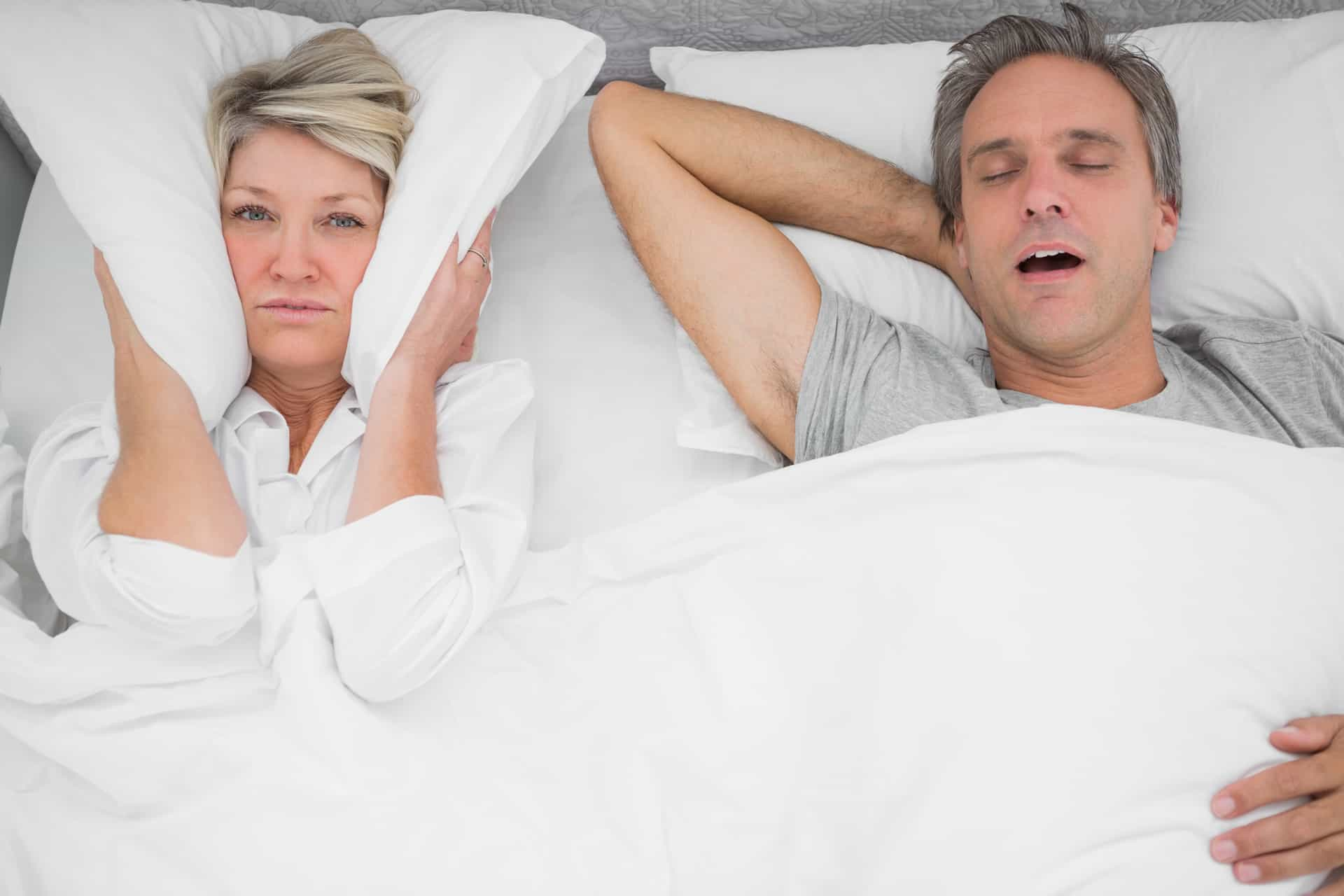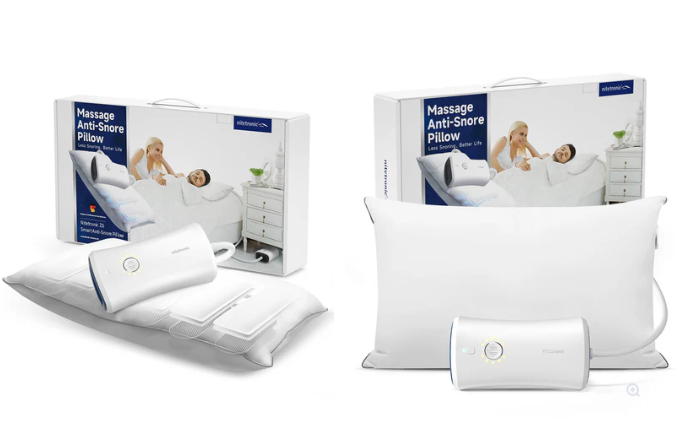Have you ever been woken up in the middle of the night by the sound of your own snoring—or perhaps by your partner's relentless snoring? Snoring is more than just an annoying noise; it can disrupt your sleep, affect your health, and even strain relationships. But what causes this noisy phenomenon, and more importantly, what can you do about it?
In this blog post, we will delve into the science of snoring—exploring its causes, the process behind it, and various treatment options. Plus, we’ll introduce an innovative solution designed to help you enjoy peaceful, uninterrupted sleep: the Nitetronic Z6 Smart Anti-Snore Pillow.
What Causes Snoring?
Snoring happens when the flow of air through the mouth or nose is partially obstructed during sleep. This obstruction leads to vibrations in the tissues of the throat, which causes the familiar snoring sound. There are several factors that contribute to airway blockage, and understanding them is key to finding an effective solution.
1. Obesity and Weight Gain
Excess weight, especially around the neck, can lead to narrowing of the airway. As the throat muscles relax during sleep, the excess tissue can collapse and block airflow, leading to snoring. If you're carrying extra weight, you may be more prone to snoring, though losing weight can help alleviate the problem.
2. Nasal Obstruction
Conditions like nasal congestion, sinus infections, or a deviated septum can cause nasal passages to become blocked, forcing you to breathe through your mouth at night. Mouth breathing increases the likelihood of snoring, as the mouth and throat can dry out and become more prone to vibrations.
3. Anatomical Factors
Your mouth and throat’s anatomy plays a crucial role in snoring. If you have a large tongue, a long uvula (the small tissue that hangs at the back of your throat), or large tonsils, your airway may be naturally more constricted. In these cases, the vibrations caused by airflow can become louder and more frequent.
4. Age and Muscle Relaxation
As we age, the muscles in the throat and tongue relax more than they did in our youth. This leads to a greater chance of airway obstruction and snoring. In fact, snoring is more common in middle-aged and older adults due to these natural changes in muscle tone.
5. Alcohol and Sedatives
Drinking alcohol or using sedative medications before bed can increase snoring. Alcohol relaxes the muscles of the throat, making it more likely for the airway to collapse. While a glass of wine may help you relax, it can also make snoring worse.
6. Sleeping Position
The position in which you sleep can also influence snoring. Sleeping on your back increases the likelihood of snoring because gravity causes the tongue and soft tissues in the throat to fall backward, blocking the airway. People who sleep on their sides often experience less snoring.
How Does Snoring Happen? The Science Behind It
Snoring occurs as a result of airflow obstruction in the upper airways during sleep. During sleep, the muscles in the throat relax, which is a normal part of the sleep process. However, in snorers, these muscles relax excessively, causing the soft tissues in the throat to collapse and partially obstruct the airway.
As you breathe, the air moving through the narrowed airway causes the tissues to vibrate, which is the source of the snoring sound. The severity of the snoring depends on how much the airway is blocked, with more significant blockages resulting in louder and more frequent snoring.
The Health Risks of Snoring
While snoring might seem harmless, it can have serious health implications. The continuous disruption of sleep caused by snoring can lead to a range of health issues, including:
Sleep Apnea: In severe cases, snoring may indicate a condition known as sleep apnea, where the airway becomes completely blocked during sleep, leading to brief interruptions in breathing. This can significantly reduce the quality of sleep and increase the risk of heart disease, high blood pressure, and stroke.
Daytime Fatigue: Snoring disrupts sleep cycles, leading to poor-quality sleep. This can result in daytime fatigue, decreased cognitive function, and irritability.
Relationship Strain: The constant noise from snoring can affect the sleep of partners, causing frustration and even relationship tension. Lack of sleep can impair communication and emotional well-being.
Effective Treatments for Snoring
Fortunately, there are several ways to treat snoring, ranging from lifestyle changes to medical interventions. Here are some of the most common solutions:
1. Lifestyle Changes
Making changes to your lifestyle can often be the first step in reducing snoring. These changes include:
- Weight loss: Reducing excess weight, particularly around the neck, can help reduce airway obstruction.
- Avoiding alcohol and sedatives: Limiting alcohol intake and avoiding sedatives before bedtime can prevent excessive relaxation of the throat muscles.
- Improving sleep position: Sleeping on your side rather than your back can prevent the tongue and throat tissues from obstructing the airway.
2. Nasal Treatments
If nasal congestion is the cause of your snoring, treatments like saline nasal sprays, decongestants, or nasal strips can help clear your airways and reduce snoring.
3. Anti-Snore Devices
There are several devices on the market designed to help reduce snoring. These range from mouthguards that reposition the jaw to continuous positive airway pressure (CPAP) machines used in cases of sleep apnea. However, many of these devices can be uncomfortable or cumbersome to use.
4. Surgical Options
In extreme cases, surgery may be required to correct structural issues that contribute to snoring. This can include procedures to remove excess tissue from the throat or correct a deviated septum.
Introducing the Nitetronic Z6 Smart Anti-Snore Pillow
One of the most innovative and non-invasive solutions for snoring is the Nitetronic Z6 Smart Anti-Snore Pillow. This pillow uses cutting-edge technology to help reduce snoring and improve sleep quality. Here’s how it works:
How the Nitetronic Z6 Works
The Nitetronic Z6 is equipped with MEMS (Micro-Electro-Mechanical Systems) sensors and position sensors that detect your sleeping position in real-time. When the pillow detects that you’re in a position likely to cause snoring (e.g., sleeping on your back), it gently adjusts the position of your head and neck to maintain optimal airway alignment.
This dynamic intervention helps keep your airway open, reducing snoring without requiring you to make any conscious effort. The pillow's adjustable height (from 9 cm to 13 cm) allows for a personalized fit, ensuring comfort and effectiveness.
Integrated Sleep Monitoring
The Nitetronic Z6 is more than just a pillow—it’s part of an integrated sleep system. When paired with the Nitetronic Sleep Quality Measure app, you can track your sleep data, including your snoring effectiveness, snoring time, intervention time, and snoring intensity. This data helps you monitor your progress and improve your sleep quality over time.
Comfortable and High-Quality Materials
The pillow’s core is made from high-quality memory foam, which provides excellent support and comfort while conforming to the natural contours of your neck and head. The outer cover is made of 100% cotton and velvet fill, ensuring that you stay cool and comfortable all night.
Clinically Proven Results
The Nitetronic Z6 has been clinically proven to reduce snoring, making it an effective and reliable solution for those who struggle with this issue.
Customer Testimonials: What Users Are Saying
John T.: "I used to snore loudly every night, and it was affecting my sleep and my partner’s too. Since using the Nitetronic Z6, my snoring has drastically reduced. I wake up feeling refreshed and my partner is finally able to sleep through the night!"
Sarah W.: "This pillow has changed my life. The app is a great bonus, helping me track my sleep quality. I can really see the difference, and my snoring is almost gone. It’s comfortable, effective, and easy to use!"
Conclusion
Snoring may seem like a harmless issue, but it can have significant health and social implications. Fortunately, understanding the causes and treatments for snoring—along with using advanced solutions like the Nitetronic Z6 Smart Anti-Snore Pillow—can help you regain control of your sleep. Whether you're looking for a comfortable, non-invasive solution or want to track your sleep quality, the Nitetronic Z6 offers a smart and effective approach to tackling snoring.
Special Offer: The Nitetronic Z6 Smart Anti-Snore Pillow is currently available at a discounted price of $599.00 (regular price $699.00), saving you 14%. To learn more and get your own, visit the Nitetronic Official Website and check out the Nitetronic Z6 product page.
Sleep better, snore less, and wake up feeling refreshed with Nitetronic.












Leave a comment
This site is protected by hCaptcha and the hCaptcha Privacy Policy and Terms of Service apply.